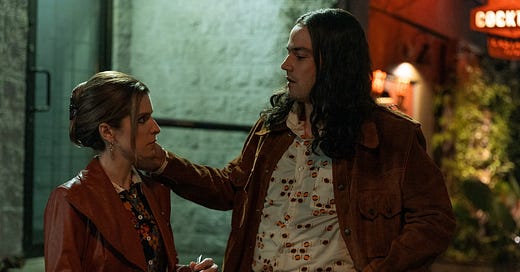'Woman of the Hour' Is the Rare Serial Killer Movie that Unnerves
Anna Kendrick's directorial debut succeeds by centering on victims rather than cops and criminals.
While Woman of the Hour would technically fall into the “thriller” genre, watching Anna Kendrick’s directorial debut is a wake-up call of how much comfort we derive from a genre with the word “thrill” in it. Furthermore, crime thrillers tend to focus on law enforcement versus the perpetrator. This dynamic builds into a battle of wits where brilliant investigators are required to capture brilliant criminals. The victims tend to be an afterthought. They color the investigation, but they’re rarely the point of it. They provide stakes—if the killer is free, people are in danger—but no specificity. In a serial killer movie, the victims live only to die.
From its disturbing first scene, Woman of the Hour shows Kendrick’s focus is firmly on the victims. From there, she broadens her scope to show that while a serial killer of women may be at the extreme end of risks that women face, the daily lives of women are about managing the feelings of men to mitigate those risks.
The movie is based on a true story about serial killer Rodney Alcala (Daniel Zovatto), who became a contestant on The Dating Game in 1978. In the hands of another storyteller, I can see the temptation to make it entirely Alcala’s story. We’re fascinated by serial killers because their monstrosity is both dramatic and personal (as opposed to, say, Henry Kissinger secretly bombing Cambodia, which had a much higher body count than whatever guy might be the subject of Ryan Murphy’s next Netflix series). But focusing on serial killers also has a way of exalting their actions and minimizing the lives of their victims. Instead, the conflict ends up being between a male serial killer and usually a male investigator, with dead women as narrative fodder.
Woman of the Hour upends the genre with Kendrick running parallel stories—one on Alcala’s murders and one on Cheryl Bradshaw (played by Kendrick), an aspiring actor in Los Angeles who books The Dating Game because her agent says it will increase her visibility. The movie pulls off an incredible feat by showing that there’s a commonality between Alcala’s violence and the microaggressions Cheryl and other women face daily. The movie balances on the razor edge of showing that while Alcala is the execution of violence, interactions with men teeter on the possibility of violence. As Cheryl’s makeup artist says to her during a commercial break, “You’re asking the question behind the question.” Cheryl, confused, asks what that is. “Are you going to hurt me?” the older woman replies.
Keep reading with a 7-day free trial
Subscribe to Commentary Track to keep reading this post and get 7 days of free access to the full post archives.





